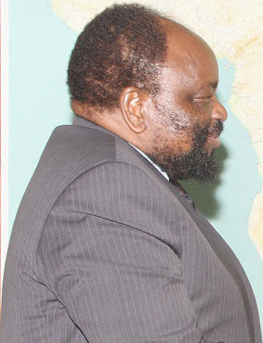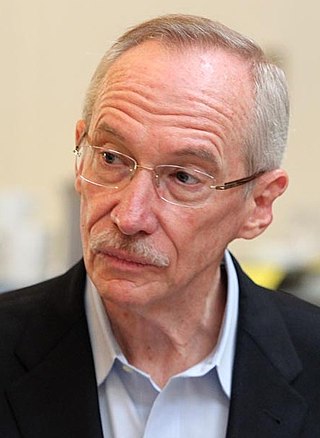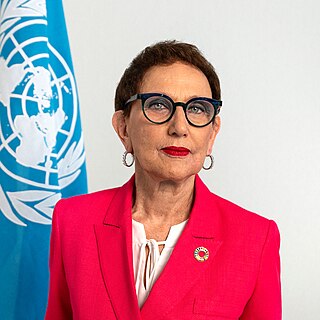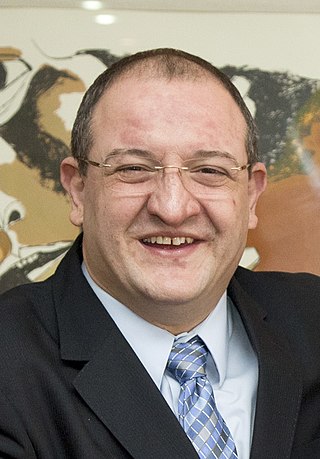
Costa Rica is an active member of the international community and, in 1983, claimed it was for neutrality. Due to certain powerful constituencies favoring its methods, it has a weight in world affairs far beyond its size. The country lobbied aggressively for the establishment of the Office of the United Nations High Commissioner for Human Rights and became the first nation to recognize the jurisdiction of the Inter-American Human Rights Court, based in San José.

The Organization of American States is an international organization founded on 30 April 1948 to promote cooperation among its member states within the Americas.

The University for Peace (UPEACE) is an international university and intergovernmental organization established as a treaty organisation by the United Nations General Assembly in 1980. The university offers postgraduate, doctoral, and executive programmes related to the study of peace and conflict, environment and development, and international law.

The United Nations Mission for the Referendum in Western Sahara is the United Nations peacekeeping mission in Western Sahara, established in 1991 under United Nations Security Council Resolution 690 as part of the Settlement Plan, which had paved way for a cease-fire in the conflict between Morocco and the Polisario Front over the contested territory of Western Sahara.

The Rio Group (G-Rio) was a permanent association of political consultation of Latin America and Caribbean countries, created in Rio de Janeiro, Brazil on December 18, 1986 with the purpose of creating a better political relationship among the countries. It was succeeded in 2011 by the Community of Latin American and Caribbean States.

Simbarashe Simbanenduku Mumbengegwi is a Zimbabwean politician and diplomat currently serving as Minister of State for Presidential Affairs and Monitoring Government Programmes. Previously he was acting Foreign Minister for a few days following the resignation of former President Robert Mugabe He had previously served as Zimbabwe's Minister of Foreign Affairs from 2005 to 2017. From October to November 2017, he was Minister of Macro-Economic Planning and Investment Promotion.

Edmond Auguste Mulet Lesieur is a Guatemalan diplomat, lawyer and notary public. He was appointed Head of the independent three-member panel to lead the Organisation for the Prohibition of Chemical Weapons (OPCW)-United Nations Joint Investigative Mechanism on 27 April 2017. Mulet served as the last Chief of Staff to United Nations Secretary-General Ban Ki-moon. Previously, he was Assistant Secretary-General for Peacekeeping Operations at the United Nations. He was appointed to this position on 2 June 2011. He was the Special Representative of the Secretary-General and head of mission of MINUSTAH, having assumed the functions of acting head of mission in the immediate aftermath of the 2010 Haiti earthquake, in which the previous head of mission, Hédi Annabi of Tunisia, perished, along with his deputy Luiz Carlos da Costa of Brazil, and the acting police commissioner, RCMP Supt. Doug Coates of Canada, when the mission's headquarters in Port-au-Prince collapsed.
The United Nations Mission in Haiti (UNMIH) was a peacekeeping operation carried out by the United Nations between September 1993 and June 1996. The Mission was reestablished (MINUSTAH) in April 2004, after a rebellion took over most of Haiti and President Bertrand Aristide resigned. This mandate ended in 2017, replaced by United Nations Mission for Justice Support in Haiti (MINUJUSTH), which saw the end of UN peacekeepers in Haiti after its ending in 2019.

New Zealand is a founding member of the United Nations, having taken part in the 1945 United Nations Conference on International Organization in San Francisco.

Jorge Rossi Chavarría was a Costa Rican politician. He was a lawyer, businessman. He co-founded the National Liberation Party (PLN) with Jose Figueres. He was Vice President of Costa Rica from 1970 to 1974 and representative from 1986 to 1990.

Rebeca Grynspan Mayufis is a Costa Rican economist who has been serving as Secretary-General of the UN Trade and Development (UNCTAD) since 13 September 2021.

Diplomatic relations between Canada and Haiti were established in 1954. During the unsettled period from 1957 to 1990, Canada received many Haitian refugees, who now form a significant minority in Quebec. Canada participated in various international interventions in Haiti between 1994 and 2004, and continues to provide substantial aid to Haiti. Both nations are members of the Organisation internationale de la Francophonie, Organization of American States and the United Nations, and are the only independent French-speaking countries in the Americas.
Anthony Banbury was appointed the President and Chief Executive Officer of the International Foundation for Electoral Systems (IFES) in 2018. He served as United Nations Assistant Secretary-General for Field Support until 5 February 2016. He resigned from this position, stating that the UN is in dire need of reform. Drawing on more than 20 years of experience with the UN, he criticized its sclerotic personnel system, a lack of accountability, insufficient impact and the UN's inability to deal with transgressions by its own staff.
Ambassador Nazareth Avendaño Incera is a career officer of the Costa Rican foreign service. She is currently the Director of the Worship Department of the Ministry Foreign Affairs and Worship of Costa Rica.
Emilia Castro de Barish was a Costa Rican diplomat. She was the first woman to be appointed a career Ambassador in the Costa Rican diplomatic service and, for many years, she was the dean of the foreign service.
African-Americans in foreign policy in the United States catalogs distinguished African Americans who have and continue to contribute to international development, diplomacy, and defense through their work with the U.S. Department of State, the U.S. Agency for International Development, the U.S. Information Agency, and the U.S. Congress, and other notable agencies and non-governmental organizations. The creators acknowledge the presence of the interagency contributions to the foreign affairs realm, and welcome additional content to showcase the achievements of African-Americans in other relevant USG agencies.

Ambassador Luis Fernando Carrera Castro is a Guatemalan economist, political analyst and diplomat. He served as Permanent Representative of Guatemala to the United Nations during the presidency of Otto Perez Molina. Before that, he served as the Minister for Foreign Affairs, during the same administration. He is a Guatemalan economist, specializing in fiscal policies, and also a political analyst. He obtained his bachelor's degree in economics from the National University of Costa Rica in 1990. Then, he obtained an M. Phil. in Economics and Politics of Development, at the University of Cambridge in 1992.
Malaysia became the 82nd member of the United Nations on 17 September 1957. Malaysia has held a rotational non-permanent seat on the United Nations Security Council for four terms, and has participated in over 30 United Nations peacekeeping missions through its MALBATT contingent since October 1960.
Azerbaijan has been a member in the United Nations since March 2, 1992, after the UN General Assembly admitted Azerbaijan at its 46th session. The Permanent Mission of the Republic of Azerbaijan was opened in New York City in May 1992. On October 29, 1991, soon after gaining independence from the Soviet Union, Azerbaijan applied to the UN General Assembly for joining the organization. Azerbaijan was elected as a non-permanent member of the UN Security Council for the term of 2012–2013.











